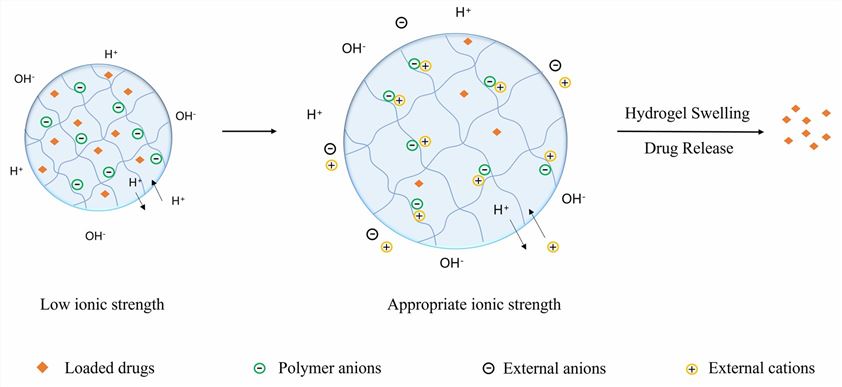Ion-Sensitive Peptide & Protein Hydrogel Development
InquiryWith a deep understanding of the unique requirements of biomolecules, CD Formulation offers customized formulations that exhibit precise ion responsiveness and controlled release profiles. Our expertise lies in selecting the most suitable polymers and crosslinking agents to ensure biocompatibility and stability of encapsulated peptides and proteins. Through rigorous characterization and optimization, we fine-tune the hydrogel formulations to achieve desired drug release kinetics.
What is Ion-Sensitive Hydrogel?
Ion-sensitive hydrogels, also known as ion-responsive or stimuli-responsive hydrogels, are a type of hydrogel that undergoes changes in their physical or chemical properties in response to specific ions or ion concentrations in the surrounding environment. These hydrogels are designed to swell, shrink, or undergo gel-sol transitions upon exposure to particular ions, leading to changes in their volume, shape, or mechanical properties. This ion sensitivity allows for precise control over the behavior and functionality of the hydrogel, making them valuable for various applications such as drug delivery, biosensing, tissue engineering, and environmental sensing.

Our Materials Used in Ion-Sensitive Peptide & Protein Hydrogel Development
| Polymers |
Poly (acrylic acid), alginate, chitosan, and other polymers with ionizable functional groups like carboxylates or amines. |
| Crosslinkers |
Multifunctional agents like N, N'-methylenebisacrylamide or calcium ions that bridge polymers during gelation. |
| Monomers |
Examples include acrylic acid, 2-acrylamido-2-methylpropanesulfonic acid. Introduction during synthesis provides sources of ionizable moieties. |
| Peptides/Proteins |
Clients' molecules of interest are incorporated into the hydrogel either by mixing or covalent conjugation of polymers. |
| Buffers |
Common solutions like PBS, HEPES and acetate buffers are used for swelling studies to evaluate response to different physiological pH/ions. |
Our Ion-Sensitive Hydrogel Analysis Services
- Swelling analysis: Measure hydrogel swelling kinetics under varying buffer conditions to determine sensitivity thresholds.
- Release kinetics: Assess active release profiles in vitro in response to ionic environmental changes over time.
- Structural characterization: Employ techniques like SEM, DSC, FTIR to analyze hydrogel morphology, crystallinity and chemical structure.
- Mechanical testing: Determine gel stiffness, strength, and fatigue limits through compression, tension or rheological tests.
- Peptide/Protein stability analysis: Use techniques like SDS-PAGE, circular dichroism to verify payloads maintain stability post-encapsulation.
- Cell studies: Conduct cytotoxicity assays and cell migration/proliferation tests to evaluate biocompatibility.
Applications of Our Ion-Sensitive Hydrogel Development Services
Tears are rich in ions such as Na+, K+ and Ca2+. At CD Formulation, we develop ion-sensitive hydrogels for ocular drug delivery by selecting appropriate polymers and cross-linkers. When exposed to tear fluid, the hydrogel undergoes controlled swelling or gel-sol transition in response to specific ions, resulting in controlled drug release and exhibiting good viscoelastic and adhesive properties.
The daily volume of nasal fluid in the adult nasal cavity is 1.5~2 mL and is rich in cations, which provides a suitable environment for ion-sensitive hydrogels to work. Our formulation scientists have extensive expertise in developing gels responsive to the ionic conditions within the nose. These customized systems hold the promise of non-invasively releasing drugs in a controlled manner tuned to the nasal ionic milieu, enhancing delivery of molecules that may treat nasal diseases.
Highlights of Our Ion-Sensitive Peptide & Protein Hydrogel Development Services
- Custom formulation for clients' proprietary molecules based on PI, sequence, and structure.
- Optimization of encapsulation efficiency and stability during ion-triggered release.
- Design of systems responsive to specific physiological ion ranges or gradients.
- Deep experience stabilizing sensitive proteins against denaturation during polymerization.
- Animal testing supports demonstrating safety and therapeutic efficacy.
CD Formulation is a leader in developing ion-responsive hydrogel platforms for sustained and targeted delivery of peptide and protein therapeutics. Our team is fully capable of designing custom hydrogels that release clients' biologics in response to specific ionic cues found in tissues of interest. We offer complete program management from formulation design to analytical testing. If you have a peptide or protein molecule that could benefit from our ion-sensitive delivery technology, please contact us!
Reference
- Janga K.Y.; et al. Ion-sensitive in situ hydrogels of natamycin bilosomes for enhanced and prolonged ocular pharmacotherapy: in vitro permeability, cytotoxicity and in vivo evaluation. Artif Cells Nanomed Biotechnol. 2018, 46(sup1):1039-1050.
Related Services



